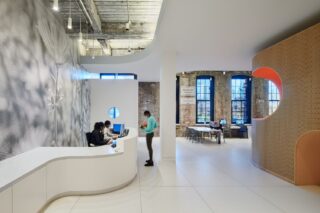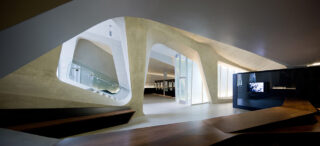New Practices in Hong Kong Architecture: A Symposium

Please join us for a symposium presented in conjunction with the exhibition, Paul Rudolph: The Hong Kong Journey, and convened by Barry Bergdoll and Seng Kuan. Taking Rudolph’s work as a jumping off point, “New Practices in Hong Kong Architecture: A Symposium” will focus on the innovative design and architectural solutions implemented in present-day Hong Kong.
The reordering of the globalized world and the emergence of a new generation of young talent in Hong Kong have contributed to a surge of creative energy in the region. On a local level, Hong Kong has seen a rise in public interest in architecture, land use, urban development, preservation, and ecology. Designers, architects, and planners are responding to Hong Kong’s new social and cultural contexts, which are vastly different from the conditions Rudolph faced over 30 years ago. The program will facilitate international dialogue between architects in Hong Kong and New York City, allowing both sides to be exposed to ideas and issues that may influence the way they design cities in the future.
Each panel will build off a key motif extrapolated from Rudolph’s design methodology and will focus on an aspect of Hong Kong’s current design culture, exploring perspectives on the evolution of design thinking and practice in the city and the region.
The exhibition Paul Rudolph: The Hong Kong Journey was organized by the Paul Rudolph Heritage Foundation.
Panel 1: Section and Ground
This panel will consider how current designers are responding to the hilly terrain, density, and scale of Hong Kong. These characteristics complimented Rudolph’s penchant for complex sections and intersecting volumes, which he used extensively in the Lippo Centre. Three decades since the building’s completion, Rudolph’s multi-tiered, inter-modal approach to circulation has only continued to expand. This panel will explore how architects today are responding to the unique conditions of this dense urban center. Extensive networks of elevated walkways and underground tunnels alter the way in which citizens interact with the ground. Architects across the globe deal with the challenge of resolving how skyscrapers hit the street. This is particularly relevant in Hong Kong, where the complex terrain and vibrant street life inform the ambiguity of the ground.
Moderator:
Mark Lee, Principal and Founding Partner, Johnston Marklee; Chair of the Department of Architecture, Harvard Graduate School of Design
Panelists:
Jing Liu, Principal and Co-Founder, SO-IL
Esther Lorenz, Assistant Professor, Director of the Architecture Undergraduate Program, School of Architecture, University of Virginia
James von Klemperer, FAIA, Principal, Kohn Pedersen Fox Associates
Panel 2: Nature
From the bucolic visions of vertical gardens in Rudolph’s Hong Kong projects, this panel will investigate the relationship between nature and the built environment. Panelists will consider topics such as Hong Kong’s evolving shoreline and tropicalism in housing and landscape design. Although a significant amount of land in Hong Kong exists in its natural state, the city is widely recognized for its cutting-edge design and urban innovation. The panel will also explore how architects mediate nature in a city of reflective surfaces and skyscrapers.
Moderator:
David Erdman, Chairperson of Graduate Architecture, Pratt Institute
Panelists:
Angela Y. Pang, Principal, PangArchitect
Calvin Tsao, FAIA, Co-Founder, Tsao & McKown Architects
Billie Tsien, AIA, Partner, Tod Williams Billie Tsien Architects | Partners
Tod Williams, FAIA, Partner, Tod Williams Billie Tsien Architects | Partners
Panel 3: City and Region
This panel will examine the central role of infrastructure, at both urban and regional scales, in driving Hong Kong’s development. The recent launch of Hong Kong’s first high-speed railway and the imminent completion of the 36km bridge connecting Hong Kong and Macau with the city of Zhuhai in mainland China have far-reaching effects on the Greater Pearl River Delta Region and the city’s territorial boundaries. Panelists will also discuss Hong Kong’s evolving relationship with its neighbors, along with the structural, institutional agents and forces that guide urban development in the area. Other topics to be highlighted will include car versus rail transport, new towns, and land use.
Moderator:
Seng Kuan, Assistant Professor of Architecture, University of Tokyo
Panelists:
Laurent Gutierrez, Co-founder, MAP Office
Doreen Heng Liu, Principal, NODE; Adjunct Associate Professor, The Chinese University of Hong Kong
Dorothy Tang, Adjunct Assistant Professor, The University of Hong Kong; Doctoral Student, Department of Urban Studies and Planning, Massachusetts Institute of Technology
Keynote:
Saskia Sassen, Robert S. Lynd Professor of Sociology, Columbia University
Reception:
Welcome:
Joanne Chu, Director, Hong Kong Economic Trade Office, New York
—
Please Note: Your registration for this event constitutes your agreement to specific and limited use of your email address, and possibly your image or voice, in related communications. Learn more in our Privacy Policy and Terms of Use. Contact info@aiany.org with questions.
As a reminder, AIA National policy requires participants to attend the entire educational portion of an event to receive continuing education credits. We encourage all participants to arrive on time to comply with this policy.
-
New Practices in Hong Kong Architecture: A Symposium is supported by a grant from Design Trust, an initiative of the Hong Kong Ambassadors of Design
-
The reception for New Practices in Hong Kong Architecture: A Symposium is sponsored by the Hong Kong Economic and Trade Office, New York
-
Funding for Paul Rudolph: The Hong Kong Journey and related programs was provided by The Paul Rudolph Heritage Foundation.

Related Events
-
Thu, Nov 29Opening – Paul Rudolph: The Hong Kong Journey
-
Fri, Dec 14 | 1.5 LUPaul Rudolph: A Way of Working
-
Wed, Dec 19 | 1.5 LUPaul Rudolph: Influences and Opportunities





